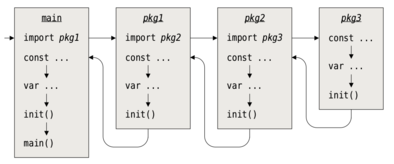Go: Main and Init functions
Table of Contents
Go reserves two function names for special purposes: init() (in all packages) and main() (only in package main). These two functions must always be defined as taking no arguments and returning nothing.
1 Program startup sequence
The initialization and execution of a Go program always begins with the main package. If there are imports, each imported package is imported in turn. Packages are imported only once even if more than one package has an import statement for the same package. When a package is imported, if it has its own imports, these are performed first. Then, the package's package-level constants and variables are created. And then the package's init() functions are called (if it has any). Eventually, all the packages are imported in the main package (and their imports and so on) are finished, at which point the main package's constants and variables are created and the main package's init() functions are called (if it has any). And finally, the main package's main() function is called and program execution proper begins.

A package may have as many init() functions as we like, however some Go compilers support only a single init() function per package, so it is recommended using at most one init() function in each package.